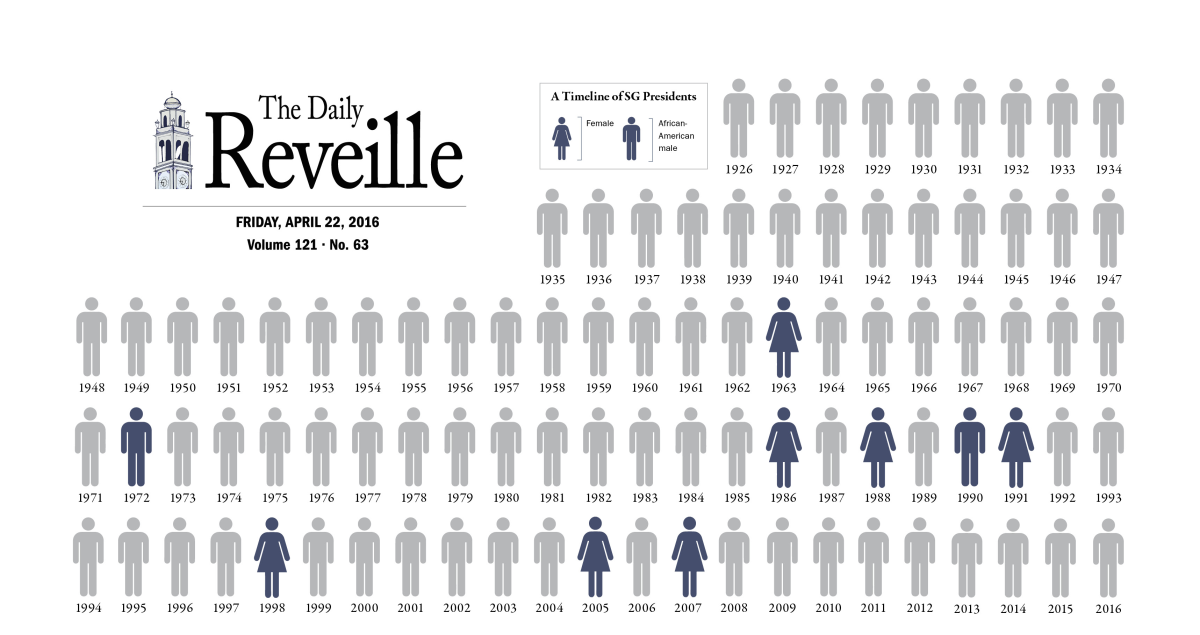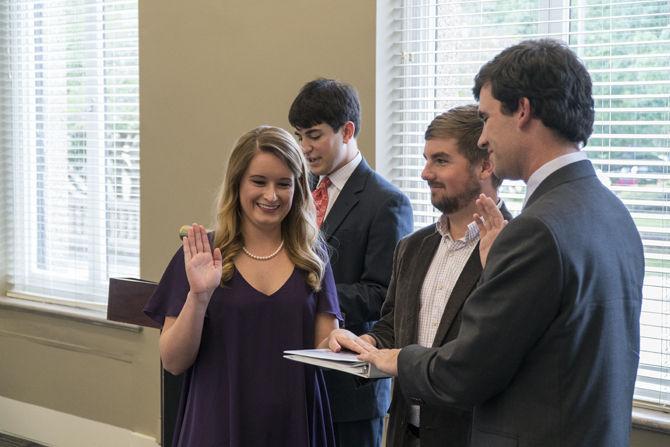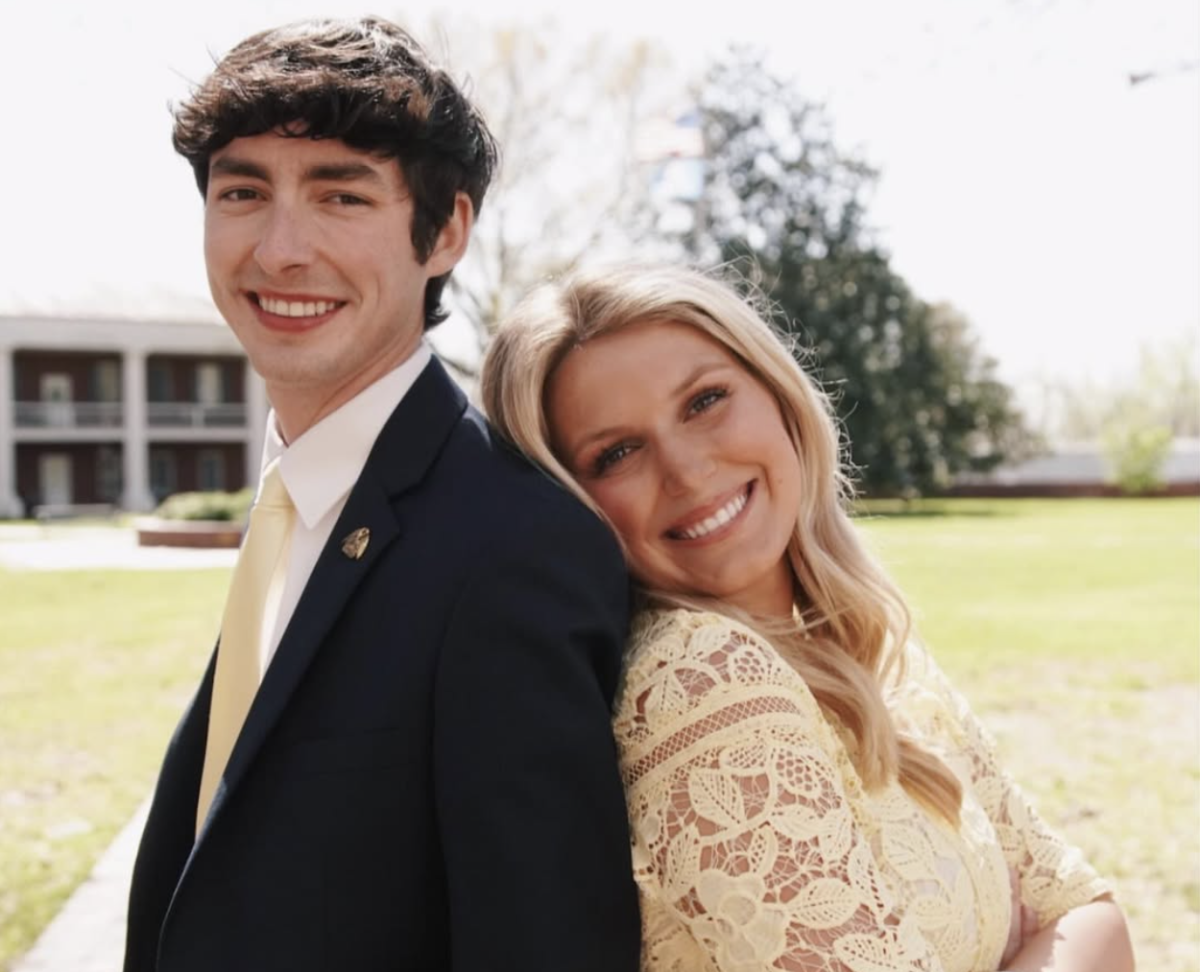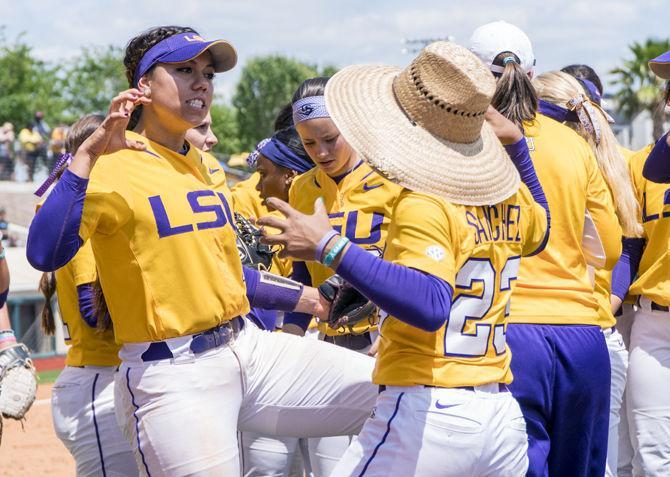Though both tickets in March’s Student Government presidential election campaigned heavily on efforts to diversify campus leadership, an analysis by The Daily Reveille shows that the University’s SG presidency has not always been representative of minorities and non-Greek students.
Since the first SG president was elected in 1926 under the title “student body president,” only two black students have taken over the role, with the first African-American man assuming office in 1972.
The first woman to assume the presidency, Evelyn Norman, took unelected office during the 1944-45 school year, ascending to the position from her role as co-ed vice president after the male president and vice president stepped down to enlist in the military. Seven women have ever been elected to the position.
Although the presidency has been traditionally dominated by men, throughout the years many women have served as vice president, a standard which may have evolved from the earlier role of co-ed vice president, a position separate from the vice presidency and reserved solely for women.
Cassie Alsfeld, who was elected in 2007, is the most recent woman to serve as SG president, and she said she believes few women have been chosen for the position because female candidates are viewed more negatively than their male counterparts.
“It’s this same stereotype that many women experience in the ‘real’ world, especially the political world,” Alsfeld said in an email. “If I was ‘assertive,’ some people misconstrued it as ‘aggressive.’ If I was passionate, some misconstrued it as ‘emotional.’”
She remembers not being taken seriously at times because of her gender, including several instances when she was left out of meetings with administrators and student leaders. However, Alsfeld said she worked to effectively communicate her message and encouraged the University and its student leaders to become more accepting.
With such a large Greek presence at the University, some students are cynical of a so-called “Greek ticket” which seems to emerge every election cycle: a white male presidential candidate and a white female vice presidential candidate who are both active in Greek Life.
Concerns about SG being a Greek-dominated organization are not new to campus.
A March 1967 edition of The Daily Reveille reported that most of the “campus ‘political figures’” interviewed about the politics of SG agreed that “fraternities and sororities play an integral role in getting student government officials elected.”
Candidates who ran for the presidency and were not members of Greek organizations were often designated as “independents” in election coverage. While it was not uncommon for non-Greek students to campaign for president, their victories were often noteworthy because they were not the norm.
For example, when independent candidate Randy Gurie won the spring 1968 presidential election, The Daily Reveille’s report on his victory noted that he was the first independent elected to the position since 1963.
According to the March 1967 story, the unity of Greek organizations made it easier for candidates “to mount a political running base,” and one of the realities of campus political participation was that independent students were “‘terribly apathetic’ toward voting.”
In 1987, independent candidate Mark Tullis’ presidential victory stunned even himself.
“Historically, we were supposed to lose. We’re radicals — we’re not supposed to win,” he said in an April 1987 edition of The Daily Reveille.
An article published just before his election illustrated that the Greek vote would play a significant role in the outcome, whether it bolstered Tullis or his Greek opponent. The independent candidate who lost the presidential election the previous year said both he and the 1985 independent candidate had not been able to garner enough Greek support to take home victories, but he said he believed Tullis could.
Elaine Durbin, who was elected president as an independent in 1963, responded to speculation that there was sometimes “primping and pruning of prospective candidates for SGA offices by both fraternal and other student organizations” by affirming that it “definitely goes on,” according to the March 1967 report.
However, Durbin, who joined a Greek organization after being elected, also said she did not see this as problematic when the candidate being groomed was qualified for the position.
Since 2009, 13 of the 16 SG presidents and vice presidents elected have been involved in Greek Life, including 2016 winners Zack Faircloth and Lindsey Landry. Landry is a member of Kappa Delta sorority, and Faircloth is a former president of his fraternity, Phi Gamma Delta.
Landry said that, while their relationship with the Greek community was an important factor during their campaign, she believes their success came from their initiatives, not fraternities and sororities.
“It was important because it gave us a support system and the ability to form relationships with different students,” she said. “But we didn’t run on the fact that we were Greek. We ran on the fact that we had the best candidates and initiatives.”
Faircloth acknowledged SG has not had an especially diverse history, and he hopes his administration will take steps to change that negative aspect of the organization.
“Our platform was ‘Forward,’ and we’re going to build on the things we know SG hasn’t done well in the past,” he said. “That’s what we’ve said all along, and obviously that’s one of the areas we’re focusing on.”
Director of Greek Life Angela Guillory said SG is a common organization for members of Greek Life to join because they see it “as an opportunity to maximize their ability to influence.”
“Students who join [Greek] organizations tend to be students who enjoy being part of a steady group of the same people,” Guillory said in an email.
She also said that, while she has noticed the presence of a “Greek ticket” in recent years, she thinks it’s healthy to have banners from both campaigns hanging from fraternity and sorority houses.
Mass communication and political science professor Martin Johnson said it “absolutely” makes sense for there to be an annual “Greek ticket,” because Greek candidates have an established group of voters to draw upon.
“When you win any election, you have to find a way to mobilize blocks of voters that are going to reliably turn out for you,” Johnson said. “We have these massive, life-involving organizations filled with votes, so why wouldn’t you try to mobilize Greek votes?”
During Johnson’s time at the University, he served as editor in chief of The Daily Reveille, and he remembers when Kirt Bennett, the second black SG president in University history, was elected in 1990.
“Thinking about the frequency with which African Americans get elected student body president at LSU, it’s not a common thing,” Johnson said.
Although some believe SG has historically followed the “Greek ticket” trend, with a white male president and white female vice president, that wasn’t always the case. Stephen Moret, president of the LSU Foundation and a former SG president himself, said there was a trend in the 1990s of having a white and black male run on the same ticket.
Moret was president from 1993-94, during a time when he said SG needed major reformation. He said SG — or the Student Government Association, as it was called during that time — was a political environment marked by scandals and unfair election processes.
“Before I became president, that was the extreme low point of the organization,” Moret said. “There were discrepancies with the campaigns. The chancellor actually had to cancel the whole elections and get the administration to run them to make sure they were managed correctly.”
Moret said there was an incident during his election season between two other tickets, one of which featured a black candidate for president. He remembers racially charged paraphernalia spread around campus as one of the many corrupt instances within SG at the time.
Moret acknowledged he and his running mate, Amanda Bolz, were the stereotypical “Greek ticket” in their election. He was a member of Lambda Chi Alpha fraternity, and she was active in her sorority. But Moret believes the reason so many members of Greek Life are also involved in SG is because they are generally more active on campus than non-Greeks.
SG presidency dominated by white, male representation; makes use of Greek organizing
April 21, 2016
More to Discover












